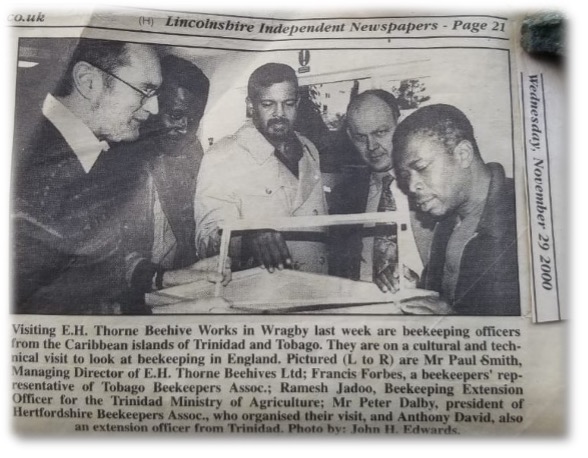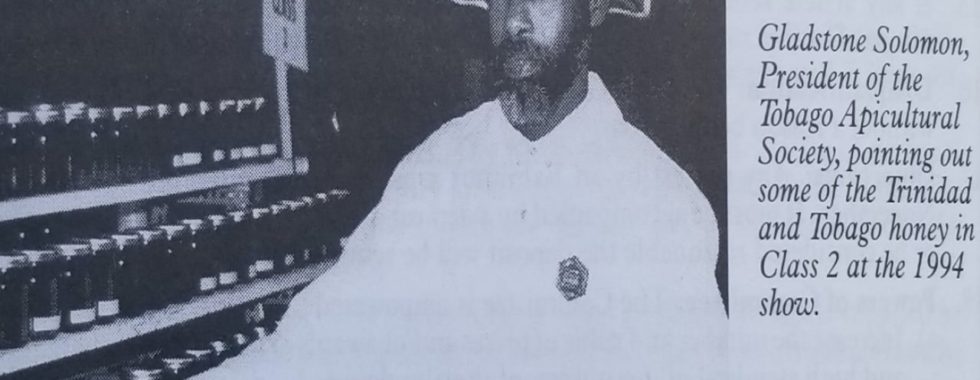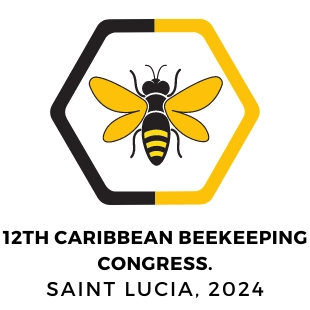Trinidad and Tobago Participation in the National Honey Show, London
Honey shows have traditionally served to showcase honey and other primary as well as secondary products from beekeeping. Some shows are established calendar events, others are occasional happenings usually associated with gatherings of sector stakeholders.
The National Honey Show (NHS) is an annual event held in and around London, England, at the end of October. The first staging of the NHS was held in 1923 and continued to be held each year in October with the exception of the period of the Second World War. Over the years the NHS has evolved to include a lecture convention, workshops and nearly two hundred and fifty Competitive Classes some of which are international classes. THE NHS is widely considered as the United Kingdom’s premier honey show and attracts beekeepers and entries from all over the world to compete for the much-coveted trophies and prizes.
Trinidad & Tobago’s (T&T) participation in the NHS must be credited to Surrey beekeeper and former NHS Executive Committee member, Michael Duggan. I first met Mr Duggan on his visit to Tobago on a pollen and honey sample collection mission in 1986. On his second visit a year later, Mr Duggan took honey from Timothy Mentor’s Signal Hill apiary and entered it in Class 2; one of the NHS classes open to the ‘British Commonwealth and the Republic of Ireland’. The entry won a silver medal (2nd place) and received national media coverage in T&T. The following year, Mr Duggan, with whom I exchanged correspondence since our initial meeting, encouraged my participation in the Show. I used the opportunity to inspire members of the national beekeeping community to participate in the NHS and coordinated the national effort in that regard from 1988 to 2001, except for 1993, when we did not participate.

Michael Duggan my international beekeeping mentor and friend
That period of continuous participation in the NHS came to an end in 2001 because of T&T’s inability to comply with the requirements of the European Union’s Council Directive 96/23/EC on measures to monitor certain substances and residues thereof in live animals and animal products, which came into effect just prior to the convening of the Show. That year, honey entries already packaged for shipment to the UK had to be returned to beekeepers after all efforts at intervention, diplomatic and otherwise from both ends of the spectrum, failed.
Over the years, British West Indian Airways, (BWIA), the then national airline and Trinidad and Tobago’s High Commission in London provided invaluable assistance to beekeepers’ participating in the NHS. The former absorbed the cost of transported honey entries to London and provided discounted return airfare to beekeepers attending the Show. BWIA’s collaboration was further incentivised by an agreement with the NHS organisers, effected from 1994, to print a BWIA advertisement in the NHS Schedule, as well as to display a BWIA promotional banner at the NHS venue. Staff at the Trinidad & Tobago High Commission in London facilitated the collection of honey entries on arrival at the airport in London, assisted with the finalisation of show entry documentation and other requirements, and transported honey entries to the show venue. I am obliged to mention Mr Gerrard Matthews whose exceptional service in that regard symbolised the commitment and passion with which he and his colleagues at the Commission attended this undertaking.
In instances where a beekeeper(s) travelled from T&T to London to participate in the Show, they were generally required to assist in the final preparation of the honey entry at the High Commissioner’s office. On most occasions arrangements were made for such persons to serve as Judges’ Steward or Show Stewards, and for them to undertake a post NHS programme of technical visits before returning to T&T.


I am obliged to further acknowledged that Mr Duggan, now deceased, was the principal broker in the collaborative developments involving the national beekeeping community, BWIA and the T&T High Commission, that characterised T&T’s participation in the NHS between 1986 and 2000. I assisted as local coordinator in that undertaking during the said period.
During the identified fourteen year period , Trinidad & Tobago beekeepers won an accumulated total of 58 awards at the NHS; 32 from Tobago and 26 from Trinidad, including two first places and the coveted Hender (Challenge) Cup, 3 silver medals (2nd place), and two bronze medals (3rd place) plus several levels of Commendation in the prestigious Class 2, as well as several first, second, and third places, and Commendations in Classes 1A and 3A, the other classes in which Trinidad & Tobago beekeepers entered. Joanne Hinkson and Peter Vidale, both from Trinidad, won the prestigious Hender Cup (Class 2) in 1999 & 2000, respectively. Tobago beekeepers won a total of three 2nd places in that class; Margaret Keens Dumas won two in 1991 and 1999, in addition to Mentor’s in 1987. T&T was the first country outside the UK to win the coveted Hender Cup in the show’s history. The victory presented a challenge to the show organisers who had to have the Cup insured before it could be taken to Trinidad. There was keen interest from T&T entrants to win the Cup for a third successive year, unfortunately, enforcement of the referenced EU regulation in 2001, negated that possibility.

It’s an open secret that T&T participation in the show over the years was missed by the show organisers. In addition to adding variety to, and heightened competition in the show, our honeys were entered in a ‘gift’ classes which meant that while there was no entry fee, the entry became the property of the NHS and was sold for the benefit of the show funds prior to the closing of the show. Needless to say, the demand for our honey entries was always very high, particularly so amongst the staff at our High Commission.
Encourage by several organisers of the NHS whom I met on a visit to the UK in 2016, I attempted to facilitate T&T’s re-enter the NHS the following year. Having first sought and obtained the approval of the Presidents of the four beekeeping associations in T&T to pursue the re-entry initiative, I further sought the assistance of the Minister of Foreign Affairs, the Minister of Agriculture, Land & Fisheries, and the then newly appointed High Commissioner to London, in securing entry of T&T’s honey to the UK, exclusively for entry to the NHS. While the requested assistance was received, the desired outcome was marginally successful.
The Ministry of Foreign Affairs informed that unless the requirements of the European Union’s Council Directive 96/23/EC were satisfied, only honey up to 2kg in total would be permitted entry into the United Kingdom provided it has been declared on arrival in the United Kingdom to the relevant authorities and subject to the application of general United Kingdom regulations.
On that basis, two beekeepers from Trinidad, Gerard “Corkie” de Gannes and Lincoln Hee Chung availed themselves of the facility and personally took their honey entries to the NHS. Their entries did not reach the winner’s podium, but T&T flag did, as shown in the picture of Corkie proudly receiving his certificate of participation. The following year (2018), Corkie and Lincoln sent a honey entry to the UK by international courier and arranged for their entry to the taken to the Show. T&T was again represented at this prestigious event thanks to their spirited effort.

HC Orville London presenting “Corkie” with his certificate of participation at the NHS in 2017.
Over the years, three of our High Commissioners were invited and accepted invitations to officiate at either the opening or closing ceremony of the NHS:
- Mr. Ulric Cross (1992)
- Mrs. Sheelagh de Assuna (1998)
- Mr. Orville London (2017).
Our UK High Commissioners and in many instances their staff can attest to the elevated profile of Trinidad and Tobago in the UK beekeeping community through the country’s beekeepers’ participation in the NHS. T&T success at the NHS has not escaped the attention of business interests in the UK. There have been repeated requests for imports of T&T’s honey, several reportedly received by our High Commissioners over the years. I have also received and shared a few with our beekeeping community. Generally, these requests have remained unfilled, even so, I am aware that small volumes of honey have been exported to the UK.
Perhaps the most enduring feature of T&T’s participation in the NHS is recognition in our domestic market that our honeys are manifestly ‘world class’ and is indeed a premium product. Another legacy feature is sustained interest in an annual exclusive beekeeping tour (marketed as ‘Beekeeping Safari’s) to T&T from the UK, organised by the specialist beekeeping organisation “Bees for Development”. I have been privileged to host this undertaking from its inception in 2000. Several participants on same have made return visits to both islands to further enjoy our unique socio-cultural and environmental attributes and, of course, to savour the flavours of our honey.
As noted, the NHS is not only about liquid honey in jars. Show classes opened to the world include honey in several other forms, bees wax in several forms, mead, honey beer, designs and displays, photographic, microscopy, videos and essays, marmalade, and honey vinegar classes. In that regard, consideration must be given to revitalising T&T’s longstanding participation in the NHS by entering in the aforementioned classes and capitalising on the opportunities to establish our credentials in an international arena where the best of the best meet, greet and compete.


